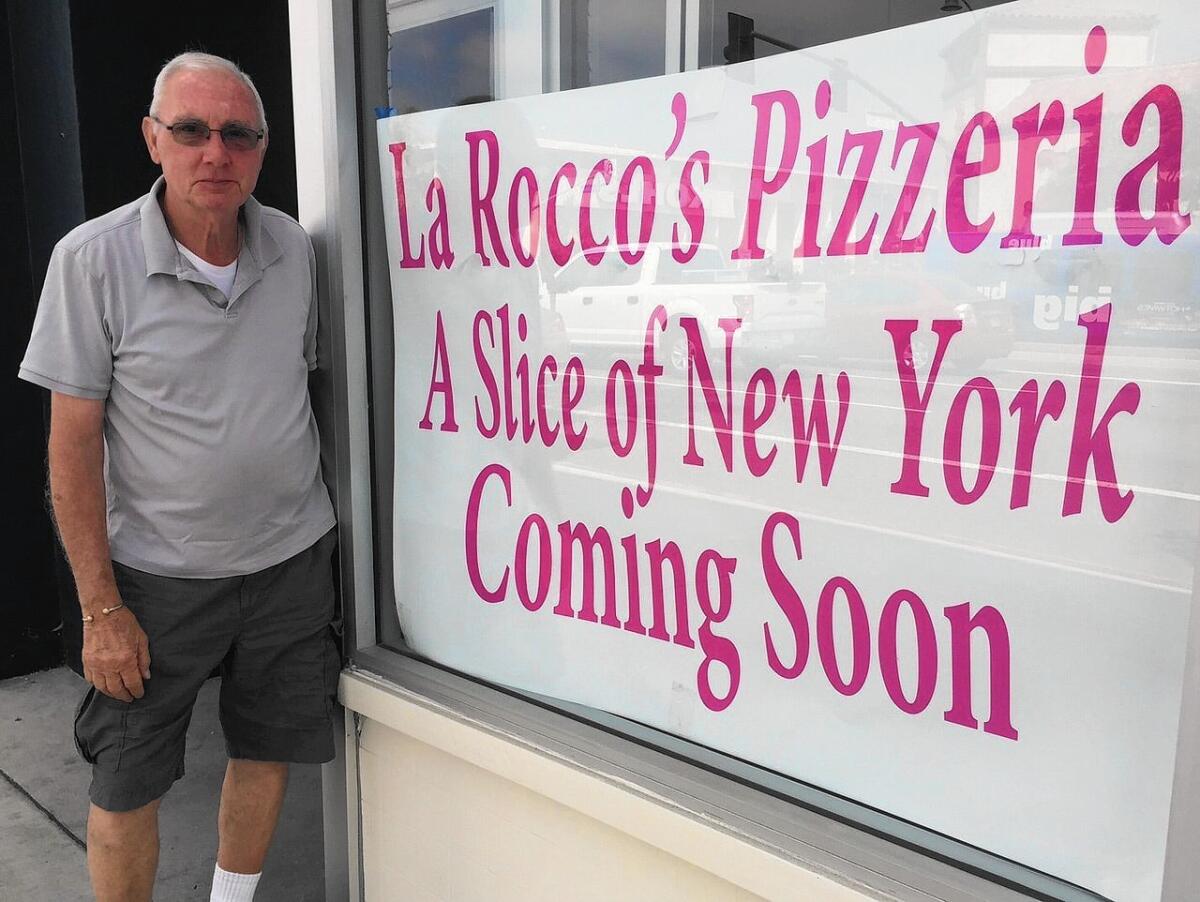Pizza maker burns time and dough on red tape

Paul LaRocco has waited more than a year to cut through the city of L.A.’s red tape at his Westchester pizzeria and serve his first slice.
How long does it take to open a pizzeria in Los Angeles?
Longer than it should, which may not come as a big surprise to anyone who has done business with City Hall and everyone’s favorite utility, the Los Angeles Department of Water and Power. And longer, at least in some cases, than it does in Culver City, San Clemente or Huntington Beach.
Paul LaRocco knows this because he’s opened pizza parlors in those cities, where the entire planning and permitting process took several months on average.
Then he got it in his head to open another LaRocco’s Pizza in Westchester, on Sepulveda near LaTijera. That was in February. Not February of this year, but February of the year 2014.
“And I’m still not open,” said LaRocco, a former mail carrier in New York and Newport Beach who retired from that racket in 2003 and decided to deliver pizza instead of letters.
SIGN UP for the free Opinion newsletter >>
This is a tragedy in more ways than one — LaRocco makes great pizza, and Westchester is missing out on it. I know this because I sampled a couple of slices at his Culver City pie house on Main Street on Monday afternoon.
On Tuesday, I met with LaRocco and his wife, Sue, and their contractor, Sunny Pinhero, at the unopened Westchester branch. It will seat 42 customers and employ up to 20 full-time and part-time employees, all of which will be very good for the neighborhood, the economy and the city treasury, should the restaurant ever open.
“Twenty months already, for a small restaurant like this?” asked LaRocco.
Have you ever tried opening a restaurant, or talked to anyone who has? They have an unmistakable look of desperation about them, and at the slightest provocation, will launch into jeremiads about grease-pan requirements, maxed-out credit cards and sleepless nights.
LaRocco has spent roughly $25,000 on planning and permits so far, with the first paperwork filed at City Hall in May of 2014. You need a plumbing permit, a mechanical permit, an industrial waste permit, a structural permit, an electrical permit, a secondary electrical permit, a health permit and on and on and on.
LaRocco got all of that and decided against spending an additional $15,000 to speed up the permit to serve beer and wine. Luckily for him, he found a generous landlord who must have anticipated what he was in for, because she gave him an eight-month grace period on the rent, followed by four months at half price.
But LaRocco has been paying the full $4,000 a month for rent and another $2,000 or so for the furniture and ovens and everything since April, and excuse me here, but that’s a lot of dough.
Everything is ready to go, he said. The brick ovens are in place. The furniture is set up. The soda fountain is ready for business.
So what’s the hang-up now?
There’s no power supply, even though LaRocco and Pinhero have been marching in place, like barefoot tomato crushers, since last September with LADWP.
“The building department was much better than the DWP; I don’t have a big problem with them. The DWP was a bigger issue,” Pinhero said.
LaRocco and Pinhero conceded that the project was complicated in some ways. The space was being converted from a retail operation to a restaurant, for one thing. But they didn’t expect DWP to tell them that far more power, and a different kind of wiring than what they planned for, would be required.
And that they’d have to redo the wiring for adjacent tenants, as well.
That set them back three months; they had to get clearance from the landlord and redo the electrical engineering plans.
“It’s about twice as bad as anywhere else,” Pinhero said of ironing out these kinds of details in Los Angeles versus surrounding communities where he also works. “There just seems to be a disconnect between all the different departments.”
At one point, a frustrated Pinhero went to the DWP building and waited to see someone. After waiting for four hours, he gave up. He went back another day and finally saw someone after a two-hour wait, but the delays continued to drag on.
“From what I see on my tracking system, it looks like the site has some challenges,” said Marv Moon of the DWP, referring to the wiring issues. He added that “it takes a lot of coordination to get service in.”
Raymond Chan, general manager of the city’s Building and Safety Department, looked up the records on LaRocco’s and said it appeared to him that his department had been pretty efficient and that delays on the part of the contractor or owner contributed to the drawn-out process.
“I think everybody could have improved on this one,” Chan said.
LaRocco and Pinhero aren’t buying that, aside from the three-month rewiring delay. It took six weeks, LaRocco said, for one city department to receive documents sent from another city department, and he was often confused as to whether he had passed or failed various on-site inspections and unclear on when he would hear back again.
Chan said an express system for restaurants and other hospitality industry projects has been established to address complaints and streamline the process. A sort of case manager takes charge of a project and cuts through a lot of the red tape, but LaRocco and Pinhero were unaware of this program when they started the project, and no one at City Hall told them about it.
According to Chan, more than 500 restaurants have gone through the express program, taking about nine months on average from start to finish. He told me the city has to do a better job of making sure contractors know they can take the expressway.
Not to be too picky, but even nine months sounds more like a covered wagon trail than an expressway.
With a good case manager, Chan said, and an aggressive contractor, a restaurant can open in three months.
That’s more like it.
Chan called LaRocco on Tuesday afternoon and arranged for a conference call between them, DWP and Pinhero on Wednesday morning at 7:15 to get things moving. So with any luck, LaRocco’s will open before much longer, and when it does, I recommend the Paul’s Special.
That’s a thin, crispy-crust white pie with garlic, chopped basil, Parmesan, mozzarella and fresh tomatoes. It’s so delicious, you’ll almost forget you had to wait 20 months to bite into it.
Twitter: @LATstevelopez
MORE FROM STEVE LOPEZ:
Eyewitness to Watts riots won’t give in to discouragement
In Katy Perry versus the nuns, both sides declare partial victory
Mayor Garcetti has served up big, heaping plates of waffle
More to Read
Sign up for Essential California
The most important California stories and recommendations in your inbox every morning.
You may occasionally receive promotional content from the Los Angeles Times.











